
- PRO-ED Order Form
- Research & Testing
- Publish with ProEd
- Reprint Permission
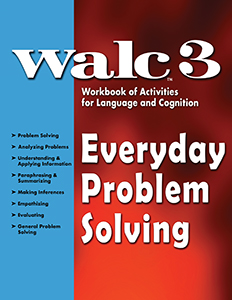

WALC 3 Everyday Problem Solving E-Book
Linda bowers • rosemary huisingh • paul f. johnson • carolyn logiudice • jane orman.
- Product Number: 33629E
- ISBN 978-1-416-40842-0
- Format: EBOOK
- Weight 0 lbs.0 oz.

Description
Ages: Adults
Practice seven specific problem solving skills in isolation. Then, apply them to depicted situations and generate and evaluate solutions.
Written in the best-selling format of the Workbook of Activities for Language and Cognition series, these activities have:
- easy-to-read format
- simple, concise language
- consistent progression of complexity within and between tasks
- application to a wide range of acquired cognitive-language disorders
Focus on the cognitive processes and strategies used in problem solving. Hundreds of problem scenarios are presented based on common themes of money, work, family and social relationships, health and safety, and sports and leisure. Multiple-choice and open-ended questions guide clients to practice the targeted skills.
The first section of the book gives practice in these skills:
- Problem Solving - Identify a problem statement based on a brief scenario. Generate a quick solution based on limited information.
- Analyzing Problems - Clients study scenarios based on everyday activities. Many of the scenarios are based on functional reading such as advertisements, receipts, prescription labels, and sports schedules. The activity questions prompt clients to think about details that will help solve the depicted problems.
- Understanding & Applying Information - Identify information that is useful for problem-solving and apply it to depicted situations.
- Paraphrasing & Summarizing - Clients restate information in their own words. In the process, they identify the most important information. This skill helps them arrive at quicker solutions in problem solving.
- Making Inferences - Clients learn to consider all the factors when they make inferences in a variety of depicted situations.
- Empathizing - Clients consider the feelings of others and their own feelings as they analyze problems.
- Evaluating - Clients weigh the solutions to problems, paying close attention to details.
The last section of the book gives practice in integrating the above skills. Real-life problems are presented in a brief article, similar to something you might read in a local newspaper. Clients use the information in the article, the corresponding picture, and their own experience to approach the problems effectively.
E-Book Features and Benefits
- Accessible from any device with Internet access
- Search and find using keywords
- Add notes and bookmarks as you read
To see more of this product's contents:
- Table of Contents
- Introduction
- Sample Pages
- About the Authors
191 pages • e-book • ©2003

Shopping Cart
Professional resources, assessments, and educational books.
- Special Education
- Occupational Therapy
- Speech & Language
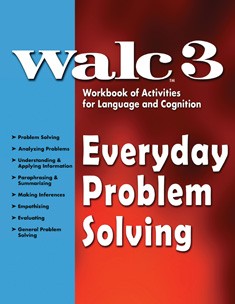
Everyday Problem Solving
- Format 8.5" x 11"
- Product Code 31629 ( MR #065521 )
Price $54.00
Focus on the cognitive processes and strategies used in problem solving. Hundreds of problem scenarios are presented based on common themes of money, work, family and social relationships, health and safety, and sports and leisure. Multiple-choice and open-ended questions guide clients to practice the targeted skills. The first section of the book gives practice in these skills: Problem Solving Identify a problem statement based on a brief scenario. Generate a quick solution based on limited information. Analyzing Problems Clients study scenarios based on everyday activities. Many of the scenarios are based on functional reading such as advertisements, receipts, prescription labels, and sports schedules. The activity questions prompt clients to think about details that will help solve the depicted problems. Understanding & Applying Information Identify information that is useful for problem-solving and apply it to depicted situations. Paraphrasing & Summarizing Clients restate information in their own words. In the process, they identify the most important information. This skill helps them arrive at quicker solutions in problem solving. Making Inferences Clients learn to consider all the factors when they make inferences in a variety of depicted situations. Empathizing Clients consider the feelings of others and their own feelings as they analyze problems. Evaluating Clients weigh the solutions to problems, paying close attention to details. The last section of the book gives practice in integrating the above skills. Real-life problems are presented in a brief article, similar to something you might read in a local newspaper. Clients use the information in the article, the corresponding picture, and their own experience to approach the problems effectively.
Workbook of Activities for Language and Cognition (WALC) <show description> • easy-to-read format • simple, concise language • consistent progression of complexity within and between tasks • application to a wide range of acquired cognitive-language disorders
- Additional Information

Table of Contents
Series related items
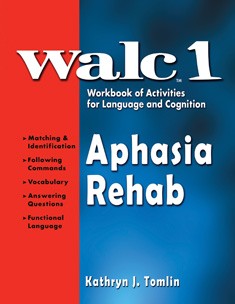
Aphasia Rehab
Workbook of Activities for Language and Cognition (WALC)
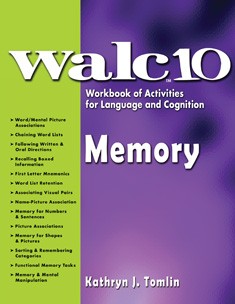
Language for Home Activities
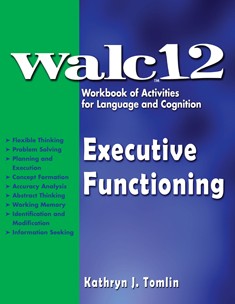
Executive Functioning
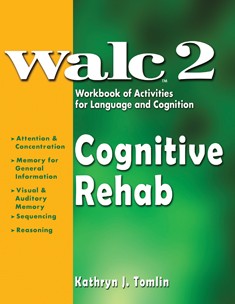
Cognitive Rehab
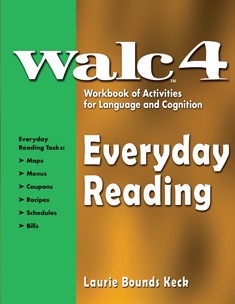
Everyday Reading
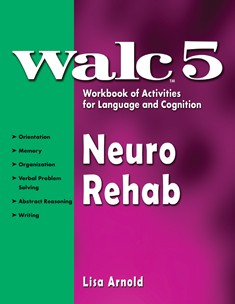
Neuro Rehab
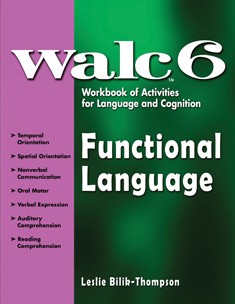
Functional Language
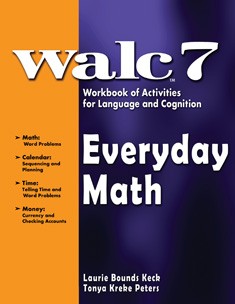
Everyday Math
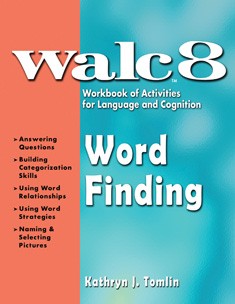
Word Finding
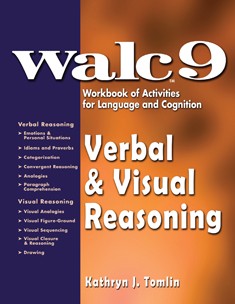
Verbal and Visual Reasoning
Packages containing this item

COMPLETE SET (12 Books)
- Copyright 2003
' + value.name + '
' + value.desc + '
Workbook of Activities for Language and Cognition (WALC) 3: Everyday Problem Solving
- MORE INFORMATION
- SPECIFICATIONS
- easy-to-read format
- simple, concise language
- consistent progression of complexity within and between tasks
- application to a wide range of acquired cognitive-language disorders
Focus on the cognitive processes and strategies used in problem solving. Hundreds of problem scenarios are presented based on common themes of money, work, family and social relationships, health and safety, and sports and leisure. Multiple-choice and open-ended questions guide clients to practice the targeted skills.
The first section of the book gives practice in these skills:
- Problem Solving - Identify a problem statement based on a brief scenario. Generate a quick solution based on limited information.
- Analyzing Problems - Clients study scenarios based on everyday activities. Many of the scenarios are based on functional reading such as advertisements, receipts, prescription labels, and sports schedules. The activity questions prompt clients to think about details that will help solve the depicted problems.
- Understanding & Applying Information - Identify information that is useful for problem-solving and apply it to depicted situations.
- Paraphrasing & Summarizing - Clients restate information in their own words. In the process, they identify the most important information. This skill helps them arrive at quicker solutions in problem solving.
- Making Inferences - Clients learn to consider all the factors when they make inferences in a variety of depicted situations.
- Empathizing - Clients consider the feelings of others and their own feelings as they analyze problems.
- Evaluating - Clients weigh the solutions to problems, paying close attention to details.
The last section of the book gives practice in integrating the above skills. Real-life problems are presented in a brief article, similar to something you might read in a local newspaper. Clients use the information in the article, the corresponding picture, and their own experience to approach the problems effectively.

MORE ITEMS FROM Resources for Life Skills
800.225.2610
WALC 3 Everyday Problem Solving


Product Highlights
- Focuses on cognitive processes and strategies
- Targets seven specific problem solving skills
Product Details
More about this product.
WALC 3 Everyday Problem Solving Focuses on the cognitive processes and strategies used in problem solving. Presents seven specific problem solving skills in isolation: Problem Solving, Analyzing Problems, Understanding & Applying Information, Paraphrasing & Summarizing, Making Inferences, Empathizing, and Evaluating. Then, activities apply them in hundreds of problem scenarios based on common themes of money, work, family and social relationships, health and safety, and sports and leisure. Multiple-choice and open-ended questions guide clients to practice the targeted skills. The last section of the book gives practice in integrating the above skills with real-life problems presented in brief articles. Answer key included.
191 pages, softcover
Available Combo Deals

It's about the kids! Supporting Teachers - Educating Kids
- New Account
Added to Cart
Walc 3 problem solving.
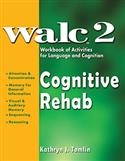
Description
Ages: 16-Adults
With 300 pages of exercises, you'll use this book for almost every client who needs help with attention, memory, sequential thought, and reasoning.
Written in the best-selling format of the Workbook of Activities for Language and Cognition series, these activities have:
- easy-to-read format
- simple, concise language
- consistent progression of complexity within and between tasks
- application to a wide range of acquired cognitive-language disorders
Activities are organized into five skill areas:
- Attention and Concentration� Simple, engaging activities help clients increase their attention and concentration. Tasks include beginner-level math problems, word-search puzzles, crossword puzzles, and visual scanning exercises.
- Memory for General Information �Clients access remote memory to answer questions. Skills in concrete and abstract reasoning, comprehension of sentences and short paragraphs, and word retrieval are reinforced.
- Visual and Auditory Memory� Learn memory strategies such as associations, chaining, and sequencing items. Thirty pages of practice materials are included.
- Sequential Thought� �Improve organization by sequencing letters to form words; words in sentences; and the steps in completing daily activities.
- Reasoning �This section has 100 pages of activities to improve reasoning, problem-solving, and personal insight. The task content progresses from concrete to abstract in this general order: concrete and abstract categorization, logical conclusions, similarities and differences, opposites, inconsistencies in sentences, analogies, word deduction, proverbs, stating the problem, improving a situation, consequences, positive and negative viewpoints, multiple character viewpoints, and deduction puzzles.
To see more of this product's contents:
- Table of Contents
- Introduction
- Sample Pages
- About the Author
301 pages � 8.5 x 11 � softcover � �2002
- Publisher: Pro-Ed Inc
- Grade Level: All
- Item #: 31629
- Availability: In Stock
Academic License Eligibility
- Academic Institutions
Academic/Student/Teacher Affiliation Required
Are You Eligible? Most products are available to everyone at our normal great prices. However, products with "Proof of Academic Affiliation Required" are only available to teachers, students, schools, and school employees and require you to verify your academic eligibility. To purchase Academic product - Add the product(s) to your shopping cart and proceed to checkout. THEN, after checking out, you may upload your Academic Affiliation when the website requests it, or you may email or fax us a picture of your school photo ID card. A valid ID contains your name, your picture, your school's name, and current enrollment dates. Be sure to include your order number with any communication. If you are a school teacher or employee, please include a picture ID or other valid ID information on school letterhead. If you have any questions, please notify us at: E-mail: [email protected] Phone: 800-877-9378 Toll-free Fax: 800-815-5154
Submit a Review

Last Items Viewed


IMAGES
VIDEO
COMMENTS
The Workbook for Language Activities and Cognition 5(WALC 5) was developed to increase cognitive skills for higher-level language processes in clients who have had neurological incidents. Your clients should find these language tasks fun and interesting because they come from their own daily experiences.
problem solve, make decisions, and achieve success in relationships with others. The tasks in WALC 9: Verbal and Visual Reasoning address multiple levels of reasoning in a wide variety of exercises. This is to improve your client's ability to reason fl exibly and to expand his ability to identify, analyze, and modify information.
thinking difficulties. Communication, decision making, and problem solving can become very confusing or overwhelming if these skills are impaired. Many factors can hinder the ability to use deductive reasoning, such as: • Difficulty understanding language or concepts due to aphasia. • Difficulty using convergent and divergent language skills.
WALC 6is Leslie's first publication with LinguiSystems. Dedication It is with heartfelt sincerity that I dedicate this book to each and every client I have worked with, for ... Attention and concentration, memory, reasoning, problem solving, and deduction can also be integrated in many of these exercises.
Practice seven specific problem-solving skills in isolation. Then, apply them to depicted situations and generate and evaluate solutions. Written in the best-selling format of the Workbook of Activities for Language and Cognition series, these activities feature an easy-to-read format, simple, concise language, consistent progression of complexity within and between tasks, and application to a ...
WALC 3 Everyday Problem Solving E-Book Ages: Adults Practice seven specific problem solving skills in isolation. Then, apply them to depicted situations and generate and evaluate solutions. ... simple, concise language; consistent progression of complexity within and between tasks; application to a wide range of acquired cognitive-language ...
Practice seven specific problem solving skills in isolation. Then, apply them to depicted situations and generate and evaluate solutions. Proud to be Canadian. CAD USD. Shopping Cart 0 Items - $0.00 ... (WALC) $54.00; WALC 10. Memory. Workbook of Activities for Language and Cognition (WALC) $54.00; WALC 11.
Problem Solving - Identify a problem statement based on a brief scenario. Generate a quick solution based on limited information. Analyzing Problems - Clients study scenarios based on everyday activities. Many of the scenarios are based on functional reading such as advertisements, receipts, prescription labels, and sports schedules.
More About This Product. WALC 3 Everyday Problem Solving Focuses on the cognitive processes and strategies used in problem solving.Presents seven specific problem solving skills in isolation: Problem Solving, Analyzing Problems, Understanding & Applying Information, Paraphrasing & Summarizing, Making Inferences, Empathizing, and Evaluating.
Reasoning-This section has 100 pages of activities to improve reasoning, problem-solving, and personal insight. The task content progresses from concrete to abstract in this general order: concrete and abstract categorization, logical conclusions, similarities and differences, opposites, inconsistencies in sentences, analogies, word deduction ...